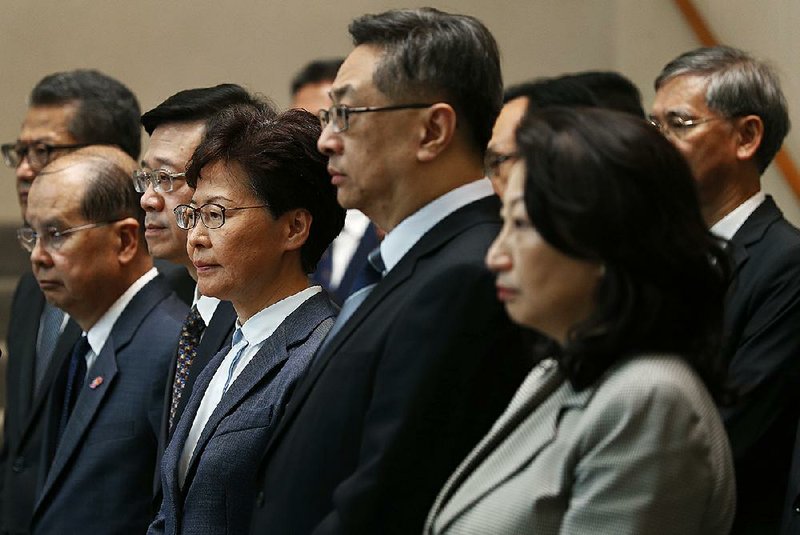HONG KONG -- China on Monday harshly criticized a weekend demonstration that targeted the nation's Hong Kong office, saying "central authority cannot be challenged."
The Chinese rebuke was in response to protesters who pelted the office with eggs and spray-painted its walls on Sunday night.
The attack on China's Liaison Office was an escalation of the weekslong protests, during which demonstrators besieged Hong Kong's legislature and police headquarters but did not direct their ire at China itself. It came after more than 100,000 people marched through the city to demand democracy and an investigation into the use of force by police to disperse crowds at protests.
Chinese officials made no mention of a violent attack hours later at a subway station in which white-clad men wielding iron pipes and wooden poles beat up people clad in the pro-democracy movement's black shirts. Dozens of people were injured.
As demonstrators made their way home, a gang of men descended on a group of them at a subway station in Yuen Long, a satellite town in northwestern Hong Kong near the border with mainland China. Video of the attack showed assailants beating protesters as they retreated into the trains, intimidated by the gangs of men waiting for them outside the turnstiles.
[Video not showing up above? Click here to watch » https://www.youtube.com/watch?v=-y889DFEthI
The attackers then entered the trains and beat the people inside as they tried to defend themselves with umbrellas.
At least 45 people were injured, including journalists and a pro-democracy lawmaker. Fifteen people remained hospitalized Monday afternoon, including one man in critical condition, the Hospital Authority said.
The injured said they believed the attackers were members of organized crime societies known as triads, and they have complained that the violence was encouraged by government supporters.
"I have strong reason to believe they were gangsters," said Lam Cheuk-ting, a pro-democracy lawmaker who was hit on his arms, hands and face, leaving his mouth with a cut that required 18 stitches to close. "I don't think any ordinary citizens have done such sophisticated, organized attacks on this kind of level."
Some subway passengers accused police officers of not intervening to protect the demonstrators, who have been critical of the police use of force.
Hong Kong leader Carrie Lam said Monday that allegations that police colluded with the assailants were "unfounded."
But in one encounter captured by photojournalists, riot police spoke with two masked men in white shirts holding metal bars or sticks. The police patted one of the men on the shoulder, then walked away.
"It's unbelievable," Lam Cheuk-ting said. "The behavior of the police force is really disgusting and shameless."
The attack followed Saturday's pro-government rally near the government headquarters, in which a founder of The Hong Kong Economic Times financial newspaper told attendees to use canes or PVC pipes to respond to protesters.
"What do we use them for? To teach our sons," Arthur Shek said. "So remember one thing: We don't need force, we need discipline. You use a cane to teach your son -- how can you call this violent?"
China, however, was focused on the Sunday night assault on Beijing's Hong Kong Liaison Office. China's national emblem, which hangs on the front of the building, was splattered with black ink. It was replaced by a new one within hours.
The official People's Daily newspaper, in a front-page commentary on Monday headlined "Central Authority Cannot Be Challenged," called the protesters' actions "intolerable."
"These acts openly challenged the authority of the central government and touched the bottom line of the 'one country, two systems' principle," the government's Hong Kong and Macao Affairs Office said in a statement Sunday.
Carrie Lam repeated the same statement to reporters Monday, adding that the vandalism "hurt the nation's feelings."
The "one country, two systems" framework, under which the former British colony was returned to China in 1997, allows Hong Kong to maintain a fair degree of autonomy in local affairs. Demonstrators fear the pro-Beijing government in Hong Kong is chipping away at their rights and freedoms, and the weekslong tumult has fueled fears of a more aggressive Chinese response.
In Washington, President Donald Trump said he believes Chinese leader Xi Jinping has acted "very responsibly" in allowing the extended protests to play out in Hong Kong. Asked about China's handling of the protests, he said that "China could stop them if they wanted."
"I hope that President Xi will do the right thing. But it has been going on a long time," Trump added, without elaborating.
Meanwhile, a group of pro-China lawmakers held a news conference appealing for a halt to the violence, saying it was a blow to Hong Kong's reputation and was scaring away tourists and investors.
They also urged police to tighten enforcement against the protesters, whom Regina Ip, a former security secretary, called "rebels."
"The violent attack on the Liaison Office ... is a direct affront to the sovereignty of our country," Ip said.
Asked why it took at least a half-hour for police to arrive at the suburban train station where protesters were attacked, she said the police were "overstretched."
"The police have been under extreme pressure," she said.
Information for this article was contributed by Nadia Lam, Ken Moritsugu, Yanan Wang, Wong Wai-bor and Shanshan Wang of The Associated Press; and by Austin Ramzy of The New York Times.
A Section on 07/23/2019
